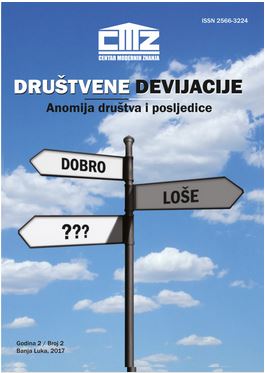MOGUĆNOSTI ZA PROVOĐENJE KVALITETNIJE INKLUZIJE NACIONALNIH MANJINA U OBRAZOVANJU
POSSIBILITIES FOR IMPLEMENTING THE QUALITY INCLUSION OF NATIONAL MINORITIES IN EDUCATION
Author(s): Šejla KadribašićSubject(s): Social Sciences, Sociology, Sociology of Culture, Ethnic Minorities Studies, Inclusive Education / Inclusion, Identity of Collectives
Published by: CENTAR MODERNIH ZNANJA
Keywords: multiculturalism in education; interculturality; inclusion; ethnopedagogy; national minorities;
Summary/Abstract: The paper discusses the problem of the position of members of national minorities and the protection of their rights in education. The international legal order that relates to this issue is not standardized nor provides clear and general instructions that would oblige all participants to abide them in practice. This problem is even more complicated by the practice of different countries in the field of education, which takes place according to various interpretations of laws and bilateral agreements. In school curricula in Bosnia and Herzegovina it is rare to find elements of the traditional culture of national minorities, whose intercultural competences would be developed in children at the earliest age. The paper especially emphasizes the importance of ethnopedagogy as a newer pedagogical scientific discipline, whose knowledge enriches not only the culture of a nation through the historical course, but by studying the universal national pedagogical knowledge, skills and practice, practice to look at one macroworld folk pedagogy that knows no borders between nations and cultures, but also offers insight into the age-old tradition of transmission of moral, ethical, esthetics and intellectual values. We will also look at the notions of intercultural competence and cultural intelligence, as well as the need to study the traditional culture of national minorities in order to better understand their national and cultural identity, their attitudes, feelings, behaviors and reactions in certain situations. A culture meeting, without whose quality interaction we can not speak of successfully accomplished intercultural communication and educational inclusion, is inevitable in the time of globalization processes. It is therefore necessary to enrich school curricula with intercultural contents in all subjects and to introduce the practice of continuous professional development of all participants in the teaching process in order to learn and develop cultural intelligence, which enables better learning in different cultural contexts - ethnic, generational and organizational.
Journal: DRUŠTVENE DEVIJACIJE
- Issue Year: II/2017
- Issue No: 2
- Page Range: 133-140
- Page Count: 8
- Language: Bosnian, Croatian, Serbian

